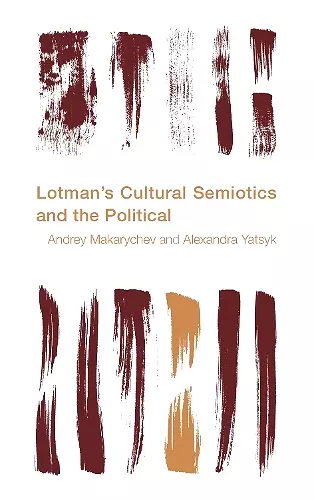Lotman's Cultural Semiotics and the Political
Andrey Makarychev author Alexandra Yatsyk author
Format:Paperback
Publisher:Rowman & Littlefield International
Published:18th Aug '18
Currently unavailable, and unfortunately no date known when it will be back
This paperback is available in another edition too:
- Hardback£127.00(9781783488322)

Yuri Lotman (1922-1993) was a prominent Russian intellectual and theorist. This book presents a new reading of his semiotic and philosophical legacy. The authors analyse Lotman's semiotics in a series of temporal contexts, starting with the rigidity of Soviet-era ideologies, through to the post-Soviet de-politicization that - paradoxically enough - ended with the reproduction of Soviet-style hegemonic discourse in the Kremlin and ultimately reignited politically divisive conflicts between Russia and Europe. The book demonstrates how Lotman's ideas cross disciplinary boundaries and their relevance to many European theorists of cultural studies, discourse analysis and political philosophy. Lotman lived and worked in Estonia, which, even under Soviet rule, maintained its own borderland identity located at the intersection of Russian and European cultural flows. The authors argue that in this context Lotman’s theories are particularly revealing in relation to Russian-European interactions and communications, both historically and in a more contemporary sense.
How do we make sense of the post-Soviet condition when the “transition” paradigm has bankrupted? How do we put Putin’s Russia in a cultural context without falling prey to essentialism and misleading generalisations? In this original and elegantly written book Andrey Makarychev and Alexandra Yatsyk interpret the work of leading Soviet semiotician Yuri Lotman to offer us an enlightening perspective to understanding the present Russian political reality. -- Ivan Krastev, Chairman, Center for Liberal Studies, Sofia
This daring and highly promising re-reading of Yuri Lotman represents cultural semiotics in an entirely new way, both conceptually and politically. The two authors develop a radically new approach with a focus on the paradoxes of the political that arise at symbolic borderlines when these are theoretically represented not as dichotomies but as complexities, such as overlaps, imbrications, interactions, and interweaving. They re-interpret cultural semiotics to demonstrate its power as an analytical tool specifically well suited for the understanding of the controversial realities of post-Soviet, post-socialist transformation. Thus revealed, the analytical and critical potential in Lotman’s philosophy of culture allows us to deal with social and political paradoxes, which is especially important nowadays, in the theoretical vacuum after the collapse of the binary schematisations of transitology. -- Irina Sandomirskaia, Professor, Cultural Studies, Södertörn university
This is a lucid introduction to the works of Yuri Lotman and the Tartu school of semiotics that he co-founded. The book succeeds in applying Lotman's insights to the study of contemporary Russian nostalgia for Soviet times and Russian demonisation of a false, decadent Europe. A welcome contribution to cultural analysis. -- Iver B. Neumann, Montague Burton Professor of International Relations, London School of Economics and author of Russia and the Idea of Europe.
In this exciting new monograph Makarychev and Yatsyk provide a path-breaking alternative to traditional political science, exploring the insights of cultural semiotics for understanding key moments in Soviet and post-Soviet history. They apply the innovative ideas of literary critic and cultural historian Yuri Lotman to key moments, including the collapse of the Soviet Union in 1991, the taking of Crimea in 2014, and the war in Donbas, using concepts such as trauma and erasure, binaries, boundaries and transgressions. They ask about the deep social structures that foster the nostalgia for Stalinism and a return to Russian Orthodoxy. By understanding the traumas and ruptures, the authors go a long way toward explaining why and how symbols and overtones play such a crucial role in the Russian political sphere today. -- Elizabeth A. Wood, Professor of History, Massachusetts Institute of Technology
ISBN: 9781783488339
Dimensions: 223mm x 151mm x 17mm
Weight: 349g
228 pages